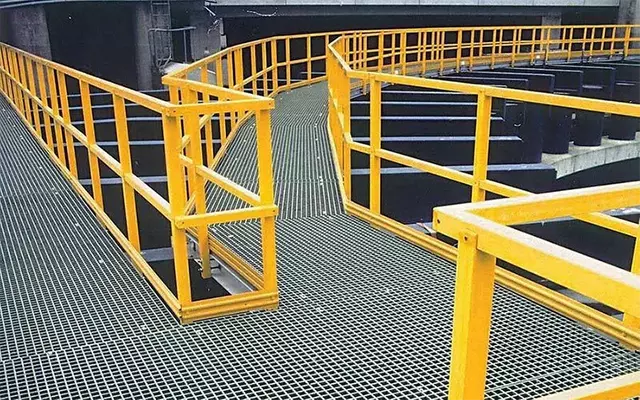There is a heightened need for industrial infrastructure materials that offer adequate safety, sustainability, and durability. One material that is rapidly gaining FRP gratings, which are becoming popular due to their lightweight strength, ability to resist corrosion, and flexibility during design. There is a drastic change in the way drainage systems, along with platforms and walkways, are maintained due to the new development in the FRP.
Marine docks, chemical plants, and urban drainage networks are adapting to the new treating systems, replacing old and infamous steel and concrete with new advanced FRP.
Table of Contents
Walkways: Changes That Are For the Better
Walkways in industrial and public areas experience high traffic, exposure to chemicals, and extreme weather changes. Steel and concrete don’t offer ease of repair option and provide anti corrosion. FRP gratings are:
- Anti-Slip Surface: FRP gratings generally are textured which helps provide grip. These FRP systems reduce the chances of slips and falls risks, even when it is wet or oily.
- Non-Conductive: These zones that are of high voltages are safe due to FRP material shielding that helps keep low radiation safe zones.
- Lightweight Yet Strong: There is a notable decrease in expenses in relocation, installation, and walkways maintenance due the FRP systems ability to multitask.
- Customizable Designs: Mesh sizes, FRP gratings color, and load ratings all can be modified to address aesthetic and functional requirements.
- FRP walkways are gaining popularity as a low maintenance hygienic flooring solution in the pharmaceutical, food processing, and wastewater treatment industries.
- Platforms: Heavy-Duty Performance the requirements for industrial platforms include supporting heavy machinery, vibration maintenance, and chemical exposure. FRP gratings not only meet these requirements, but also provide additional advantages:
- High Load Bearing Capacity: mezzanines, maintenance platforms and access decks are made from Pultruded FRP gratings as they are designed to carry heavy loads.
- Corrosion Resistance: chemical plants and offshore oil rigs prefer FRP over steel due to its non-corrosive properties when subjected to acids, alkalis and saltwater.
- Low Maintenance: FRP platforms preserves its mechanical truthfulness for years and do not have to get painted, galvanized or reviewed repeatedly.
- Fire Retardant Options: FRP products are also used in high risk environments as many meet the ASTM E-84 standards for flame spread.
FRP Gratings manufacturers are changing the game in the oil and gas, chemical, and power industries as they lower operational expenses while improving employee safety and the lifespan of the structure.
Why FRP Is Outperforming Traditional Materials
Durability – Lasts longer than steel or concrete in harsh conditions.
Safety – Slip resistance and fire-retardant options enhance workplace safety.
Cost-Effective – Less maintenance and fittings expenses creates this to be the smart long-term investment.
Eco-Friendly – FRP production uses less energy, and many products are recyclable.
Why Is The Drainage System Eco-Friendly, Efficient, and Durable?
Drainage systems are an essential part of cities, factories, and public services. The traditional drainage systems’ covers that are made of cast iron or concrete are very heavy, easily prone to theft, and decays easily. FRP grating systems offer a transformative solution:
- FRP does not chemical react with sewage, industrial effluents, or cleaning agents, making it ideal for drainage in chemical zones and treatment plants.
- FRP covers are easy to lift, making them easy to replace, and offer a reducer to much risk getting injured when operating with the covers. FRP drainage covers are lightweight.
- Stealing in public places has become an ease, and using FRP covers deter this issue. Metal covers are used as a means of theft, and FRP has no market price, therefore removing it as an ease of stealing.
- FRP covers can be custom made to any trench, all in the aim of refining the water flow, dirt, and any waste material that can clog the drainage.
- Smart city planners and municipal corporations have started using FRP drainage solutions to help public sanitation, parks, and roads.
Conclusion
FRP gratings are an exceptional material example that meet current challenges and are adaptable for future demands as industrious immersive and expand.
